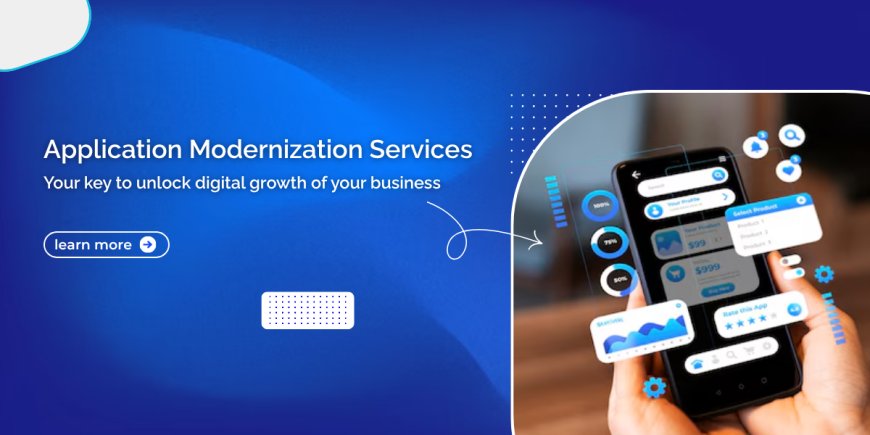Application Modernization Services – Your key to unlock digital growth of your business
Expand your business’s digital growth with expert Application Modernization Services. Transform legacy systems into agile, scalable solutions for future-ready success.

Are you thinking of digitizing your business? If your answer is yes, then this blog is right for you. In todays ever-evolving digital landscape, an outdated software system can prove a significant roadblock to business growth. As customers expectations increase, organizations must adapt themselves to cater to the requirements of customers offer a strategic and practical solution to tackle this challenge efficiently. Here, in this blog, we will talk about what application modernization is, what its significance and how businesses can benefit from it.
What is application modernization?
Application modernization refers to the process of reforming the legacy software applications to new computing approaches including frameworks, modern languages and infrastructure platforms. This process even involves replacing or rearchitecting an outdated system with native solutions. The main goal is to improve application performance, security, scalability and maintenance, ensuring your business perfectly aligns with modern business needs and technologies.

Why modern legacy applications?
Many businesses still rely on legacy systems developed long ago. While these systems may still function, they often face challenges like
- Limited integration capabilities
- High maintenance cost
- Security vulnerabilities
- Incompatibility with cloud and mobile platforms
- Lack of agility for innovation
Application modernization efficiently solves these problems by transforming the old legacy system into a new cloud-based application without even disrupting the core business operations. It enables businesses to respond to market changes, streamline business operations and unlock new revenue opportunities.
What are the key benefits of application modernization services?
- Enhance speed and agility: Modern applications are developed based on DevOps practices, allowing businesses to roll out features and update faster. This kind of agility is essential for keeping up with the market demand and catering to customers expectations.
- Improved security: Outdated systems lack modern security protocols, making them vulnerable to data breaching. Application modernization services ensure the application architecture adheres to the current security standards, reducing the risk of cyberattacks or data leaks.
- Cloud compatibility: Modern applications run on cloud native platforms such as AWS, Azure, Google cloud etc. This reduces infrastructure costs, enhances scalability and provides better accessibility
- Cost-efficiency: Maintaining a legacy system proves expensive due to its outdated technology, lack of skilled professionals and inefficient resource utilization. Modern applications are easy to maintain, need fewer resources and support automation, which results in significant cost saving over time.
- Better user experience: Legacysystems often fail to provide a seamless user experience. With application modernization services, interfaces can be updated, mobile compatibility can be provided, and application performance can be improved. This results in higher user satisfaction and better engagement
Choose the right application modernization partner
An effective and professional application modernization service needs a perfect blend of strategic planning, technical expertise and execution. Partnering with a trusted IT service provider can help you with
- Evaluating existing applications
- Defining modern strategy
- Minimizing risk and downtime
- Ensuring alignment with business goals
Therefore, you must look for a professional partner with years of experience in cloud migration.
Final words
Application modernization services are no longer optional but they are essential to stay relevant in todays digital economy. Modernizing the operational systems of an organization unlock new opportunities, reduce costs and prepare businesses for the future.




























